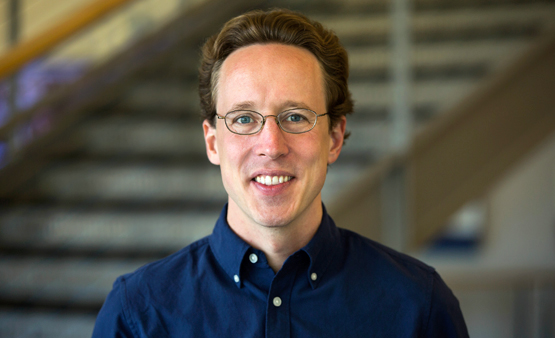Prof. J. Alex Halderman named a 2019 Andrew Carnegie Fellow
Halderman will work to further educate lawmakers, future cybersecurity experts, and the public about how to ensure that election results can relied upon and verified

 Enlarge
Enlarge
Computer science and engineering professor and noted election security expert J. Alex Halderman has been named a 2019 Andrew Carnegie Fellow for his work in strengthening election cybersecurity with evidence-based elections.
Confidence in U.S. elections has been rooted in the faith that our election technology and processes will operate correctly and securely. In recent years, that trust has dangerously frayed as investigations have demonstrated vulnerabilities and irregularities in voting and related systems.
Halderman has been getting traction in addressing the causes of this concern. His work in advocating for secure elections contributed to Congress’ decision to provide $380 million in new funding for election security last year.
Under the Carnegie Fellowship grant, Halderman will work to further educate lawmakers, future cybersecurity experts, and the public about how to adopt new practices that will ensure that election results can relied upon and verified.
“I am truly honored to have been selected for the Andrew Carnegie Fellowship,” said Halderman. “The support it provides will be absolutely vital as we seek to accelerate the adoption of secure voting practices in the US, securing elections against interference and restoring trust in our democratic system.”
Halderman calls for the adoption of “evidence-based elections” by taking two easily-achievable steps. “First is ensuring that every vote is recorded on paper and verified by the voter,” said Halderman. “Secondly, we should manually confirm that the set of paper records reflects the same winner as the computer totals. This can be reliably done by auditing a fraction of the paper ballots.”
Halderman’s goal is to accelerate the adoption of secure election processes across the country prior to the 2020 presidential contest.
“Our democracy depends on secure elections and Professor Halderman’s work to illuminate and eliminate vulnerabilities in our voting systems is a shining example of academic research in service of the common good. I’m proud to have him on our faculty. This award will enable his continued success,” said Alec D. Gallimore, the Robert J. Vlasic Dean of Engineering, the Richard F. and Eleanor A. Towner Professor, an Arthur F. Thurnau Professor, and a professor of aerospace engineering and applied physics.
Earlier this year, Halderman was named co-chair of the state of Michigan’s Election Security Commission, which is tasked with proposing actions to protect every citizen’s vote and reporting to the secretary of state and Bureau of Elections on best practices.
Previously, Halderman has testified before both the Senate Intelligence Committee and US House Appropriations Subcommittee on Financial Service and General Government to address vulnerabilities in the U.S. voting system and to recommend a policy agenda for securing the system against the threat of hacking. He regularly discusses his work in major media outlets, describing the dangers of mobile, internet, blockchain, and purely electronic voting systems. For over a decade, he has been at the forefront of exposing the security shortcomings of voting machines and systems around the world.
Now in its fifth year, the Andrew Carnegie Fellows Program recognizes an exceptional group of both established and emerging scholars, journalists, and authors with the goal of strengthening U.S. democracy, driving technological and cultural creativity, exploring global connections and global ruptures, and improving both natural and human environments. In 2019, 32 recipients were named, and each will receive a grant of up to $200,000 toward the funding of significant research and writing in the social sciences and humanities – the most generous stipend of its kind.
“Andrew Carnegie believed in education and understood its influence on the progress of society and mankind. The Andrew Carnegie Fellows Program is an integral part of carrying out the mission he set for our organization,” said Vartan Gregorian, president of Carnegie Corporation of New York and president emeritus of Brown University. “Over the past five years, we at Carnegie have been very impressed by the quality, range, and reach of our fellows’ work. This year is no exception. We salute this year’s class and all of the applicants for demonstrating the vitality of American higher education and scholarship.”
 MENU
MENU 
